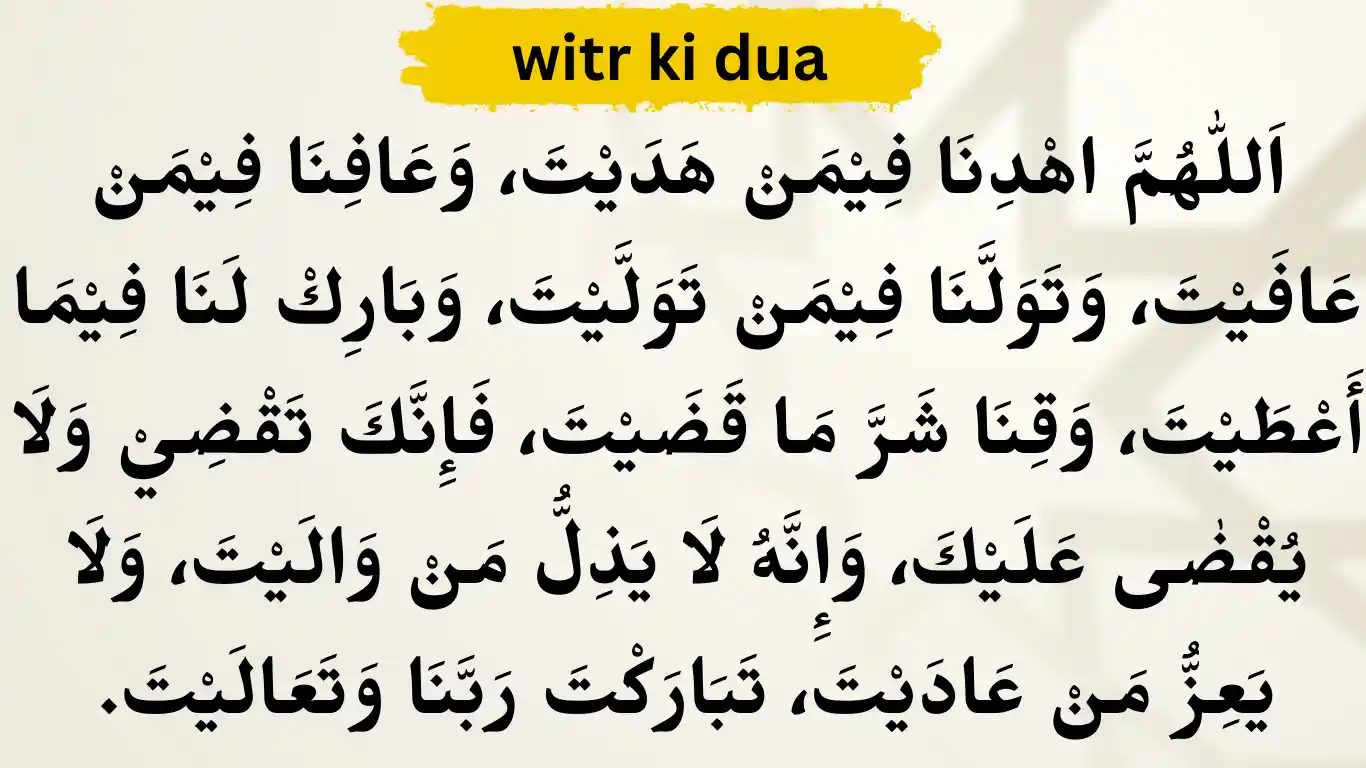Witr prayer, an essential part of the Isha Salah, holds significant spiritual importance in Islam. It is offered as an odd-numbered prayer (one, three, five rakats, etc.) and often completed with a specific dua called Dua-e-Qunoot. Understanding and reciting this dua correctly brings blessings and strengthens one’s connection with Allah. Below, we’ll explore the witr ki dua with its full Arabic text, Urdu and English translations, and related details to help Muslims fulfill this Sunnah effectively.
What is Witr Ki Dua?
The Dua-e-Qunoot is a supplication made during the Witr prayer. It is recited in the final rakah before or after the Ruku (bowing) position, depending on the practice of the respective Islamic school of thought. This supplication asks Allah for guidance, forgiveness, and protection.
Dua After Witr Prayer in Arabic
The full text of Dua-e-Qunoot is as follows:
اَللّٰهُمَّ اهْدِنَا فِيْمَنْ هَدَيْتَ، وَعَافِنَا فِيْمَنْ عَافَيْتَ، وَتَوَلَّنَا فِيْمَنْ تَوَلَّيْتَ، وَبَارِكْ لَنَا فِيْمَا أَعْطَيْتَ، وَقِنَا شَرَّ مَا قَضَيْتَ، فَإِنَّكَ تَقْضِيْ وَلَا يُقْضٰى عَلَيْكَ، وَإِنَّهُ لَا يَذِلُّ مَنْ وَالَيْتَ، وَلَا يَعِزُّ مَنْ عَادَيْتَ، تَبَارَكْتَ رَبَّنَا وَتَعَالَيْتَ.
Translation of Dua After Witr Prayer in English
“O Allah, guide us among those You have guided, grant us safety among those You have granted safety, take us into Your care among those You have taken into Your care, bless us in what You have given, and protect us from the evil You have decreed. For indeed, You decree, and no one decrees over You. He whom You befriend is never humiliated, and he whom You oppose is never honored. Blessed are You, our Lord, and Exalted.”
Translation of Dua After Witr Prayer in Urdu
“اے اللہ! ہمیں ان لوگوں میں شامل کر جو تیری ہدایت یافتہ ہیں، ہمیں ان میں رکھ جو تیری حفاظت میں ہیں، ہمیں ان میں شامل فرما جن کے دوست تو بنے۔ ہمیں اپنے دیے ہوئے میں برکت عطا فرما اور ہمیں اپنی تقدیر کے شر سے محفوظ رکھ۔ بے شک، تو فیصلہ کرتا ہے اور تیرے خلاف کوئی فیصلہ نہیں کر سکتا۔ جس کا تو دوست ہے وہ کبھی ذلیل نہیں ہوتا، اور جس کا تو دشمن ہے وہ کبھی عزت نہیں پا سکتا۔ تو برکت والا ہے، اے ہمارے رب، اور تو بلند و بالا ہے۔”
How to Recite Dua After Witr Prayer
- Rakat Position:
- In the Hanafi school, Dua-e-Qunoot is recited after saying “Allahu Akbar” in the standing position after reciting Surah Al-Fatihah and another Surah in the final rakah of Witr.
- Other schools of thought may recite it before or after the Ruku.
- Method of Recitation:
- Say “Allahu Akbar” and raise your hands as in Takbir before starting the dua.
- If you forget to recite it, the prayer remains valid but is preferred to be recited.
Importance of Dua-e-Qunoot Ki Bad Dua
The Witr prayer is described in various hadiths as a highly recommended act of worship:
- Prophet Muhammad (PBUH) said: “The Witr prayer is a duty for every Muslim.” (Sunan Ibn Majah)
- It completes your Isha prayer and is an opportunity to ask Allah for blessings and forgiveness.
Benefits of Reciting Dua-e-Qunoot Ki Bad Dua
- Strengthens Faith: By seeking guidance, protection, and blessings, you renew your trust in Allah.
- Divine Forgiveness: This supplication includes a plea for safeguarding against the consequences of past actions.
- Spiritual Protection: It shields believers from harm and evil decrees.
Tips to Memorize Dua-e-Qunoot Ki Bad Dua
- Repetition: Recite the dua after each Isha prayer until memorized.
- Small Sections: Break the dua into smaller parts for easier memorization.
- Listen to Audio: Hearing the dua repeatedly can help internalize its pronunciation and rhythm.
Related Sunnahs of Witr Prayer
- Offering the Witr prayer consistently demonstrates a strong commitment to Sunnah practices.
- It’s encouraged to recite Surah Al-A’la, Al-Kafirun, and Al-Ikhlas in the three rakats of Witr, although this is not obligatory.
FAQs:
The Witr Ki Dua, or Dua-e-Qunoot, is a supplication seeking Allah’s guidance, protection, blessings, and forgiveness. It is recited in the last rakah of the Witr prayer to enhance spiritual devotion.
Reciting Witr Ki Dua is highly recommended in the Witr prayer but not compulsory. Forgetting it does not invalidate the prayer.
Yes, it is permissible to recite Dua-e-Qunoot outside prayer for personal supplication and reflection.
Conclusion
Understanding and reciting the Dua-e-Qunoot ki Bad dua is a beautiful way to connect with Allah and seek His blessings. By incorporating this dua into your daily prayers, you strengthen your faith and ensure protection and guidance in your life. Make it a regular part of your nightly worship, and reap the immense rewards promised in Islam.
May Allah accept our prayers and bless us with His endless mercy!





I am extremely impressed together with your writing skills as smartly as with the layout on your weblog. Is this a paid theme or did you modify it yourself? Either way keep up the excellent quality writing, it is uncommon to see a great weblog like this one today!